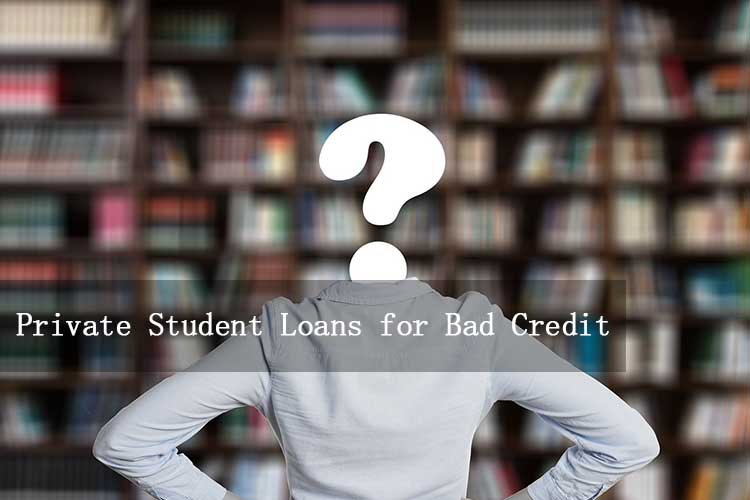
Understanding student loans can be quite tricky, particularly if your credit score isn’t ideal. Federal student loans are usually the go-to option for many students since they don’t require a credit check, but they might not fully cover all your educational costs. That’s where private student loans for bad credit come into play. If you’re curious about your eligibility for private student loans despite having bad credit and want to explore your options, this guide will provide you with all the essential information.
Can You Get a Private Student Loan with Bad Credit?
The short answer is yes, you can get a private student loan for bad credit, but it might take a bit more work and could come with higher interest rates or the need for a co-signer. Private lenders usually review your credit score to evaluate the risk involved in lending to you. If your credit score is low, they may consider you a high-risk borrower, which could lead to increased interest rates or the requirement of a co-signer to secure the loan.
What is Considered “Bad Credit”?
A “bad credit” rating typically means having a credit score under 580 on the FICO scale. Although federal student loans are not influenced by your credit score, private lenders do consider it when determining whether to approve a loan, as well as the interest rates and repayment conditions. If your score is below 600, you might find your loan choices restricted or face less advantageous terms.
However, it’s important to note that each lender has its own criteria, so even if you have bad credit, there are still opportunities available to obtain the financial support necessary for your education.
What Credit Score Do You Need for Private Student Loans?
Many private student loan providers typically look for borrowers with credit scores of 650 or above. However, there are some lenders that focus on helping students with poor credit or limited credit histories. While having a low credit score doesn’t automatically mean you can’t get a loan, it may lead to:
- Increased interest rates: Lenders often charge higher rates to offset the risk associated with lending to individuals with lower credit scores.
- Tighter loan conditions: This could mean shorter repayment timelines or fewer flexible repayment options.
- Need for a co-signer: Some lenders might ask for a creditworthy co-signer if your credit score is on the lower side.
If you find yourself in this position, it’s crucial to carefully evaluate your options and fully understand the terms of any loan you are considering.
How to Improve Your Chances of Approval
If you have a low credit score, there are several approaches you can take to enhance your chances of getting approved for a private student loan.
1. Apply with a Co-signer
One of the best ways to get a private student loan with bad credit is by applying with a co-signer. This person is usually a parent, relative, or friend with good credit. They agree to repay the loan if you can’t. Having a co-signer with a solid credit history increases your chances of approval. It can also help you secure better loan terms, like lower interest rates.
Just remember, if you default on the loan, your co-signer will also be held accountable for repayment. It’s crucial to have an open and honest conversation with your co-signer about this arrangement before moving forward.
2. Work on Improving Your Credit Score
If you don’t need a loan right away, consider taking some time to enhance your credit score before applying for private student loans. Here are a few strategies to help you improve your score:
- Reduce existing debt: Lowering your current debt can positively impact your credit score.
- Make timely payments: Regularly paying your bills on time will gradually improve your creditworthiness.
- Limit new credit inquiries: Each time you apply for new credit, it can slightly decrease your score. Be cautious of this if you plan to apply for a loan soon.
- Review your credit report for mistakes: Errors on your credit report can harm your score. Request a free copy of your report and correct any inaccuracies you find.
3. Explore Lenders That Support Borrowers with Bad Credit
Not every lender has the same criteria, and some focus on providing private student loans to those with poor credit. Take the time to research and compare different lenders, specifically looking for those that cater to individuals facing credit challenges. Many lenders offer prequalification tools that won’t impact your credit score, giving you a clearer idea of your approval chances.
Lenders Offering Private Student Loans for Bad Credit
When looking for private student loans with poor credit, it’s important to target lenders who either don’t heavily weigh credit scores or provide more lenient lending standards. Here are some well-known choices:
1. Ascent
Ascent provides private student loans tailored for individuals with limited credit history or those without a co-signer. Their Non-Co-signed Future Income-Based Loan is specifically crafted for students lacking extensive credit records but who demonstrate promise based on their academic institution, field of study, and anticipated earnings post-graduation.
2. Earnest
Earnest enables students to prequalify for loans without affecting their credit scores. They offer attractive rates and adaptable repayment plans, considering a wider scope of your financial background rather than focusing solely on your credit score.
3. College Ave
College Ave provides private loans that can be co-signed, assisting students with poor credit in qualifying. Their application process is straightforward, and they deliver loan decisions promptly, helping you find out your eligibility without unnecessary delays.
4. Sallie Mae
Sallie Mae is a well-known name in the private student loan market. They offer a variety of loans for students, whether or not they have a co-signer, and provide flexible repayment options. Additionally, they allow for co-signer release after a specified number of timely payments, making it a solid choice if you initially need assistance securing a loan but wish to take full control later on.
Impact of a Co-signer
Having a co-signer can greatly enhance your likelihood of getting approved for a private student loan, especially if you have bad credit. With a co-signer, you may benefit from a lower interest rate, which leads to reduced monthly payments and a decrease in the total cost of the loan.
Co-signer Release
A lot of lenders provide a co-signer release feature. This means that after making consistent on-time payments for a specified duration—typically ranging from 12 to 36 months—the borrower can eliminate the co-signer from the loan. Co-signer release is an excellent choice if you’re looking to assume complete financial responsibility for the loan in the future, but require assistance with approval at the moment.
Interest Rates for Bad Credit Loans
If your credit isn’t in great shape, be prepared for higher interest rates than those with top-notch credit. Private student loan rates can vary significantly, falling between 3% and more than 14%, based on your credit profile and the lender’s criteria. A higher interest rate translates to paying more in interest throughout the loan’s duration, making it crucial to evaluate if the loan will be manageable for you in the future.
Variable vs. Fixed Interest Rates
When selecting a private loan, you usually have the choice between a fixed or variable interest rate:
Fixed rates stay constant for the entire duration of the loan, allowing for consistent monthly payments.On the other hand, variable rates can change over time depending on market trends. Although variable rates might begin at a lower level, they can increase, leading to higher monthly payments.
If you have bad credit, you may find it easier to obtain a loan with a higher fixed rate. It’s important to compare both options to determine which one suits your needs best.
Loan Repayment Options
When you obtain a private student loan, it’s crucial to familiarize yourself with your repayment choices. Numerous lenders provide various repayment plans to suit different financial circumstances:
- Immediate repayment: Payments start right after the loan is disbursed.
- Interest-only payments: You only pay the interest while you’re in school, with full payments kicking in after you graduate.
- Deferred payments: You don’t have to make any payments while studying, but interest will accumulate during that period.
Selecting the appropriate repayment plan can greatly impact your financial situation, especially if you have other obligations to manage.
How to Build Credit While Repaying Loans
If you’re currently dealing with bad credit, managing your student loans wisely can actually boost your credit score as time goes on. By consistently making your payments on time each month, you show potential lenders that you can be trusted with borrowing. As your credit score rises, you might find opportunities to refinance your student loans at a more favorable interest rate, which can lead to significant savings in the future.
Tips for Building Credit
Establish automatic payments so you can always stay on top of your due dates. Maintain a low credit utilization on your other credit accounts. Regularly check your credit score to keep an eye on your progress.
Alternatives to Private Loans
If your credit score is hindering your ability to obtain a private loan, there are several other options to explore.
- Federal student loans: These loans don’t require a credit check and provide more flexible repayment choices, such as income-driven plans.
- Scholarships and grants: Numerous organizations provide financial assistance that doesn’t need to be repaid, helping to lessen your need for loans.
- Work-study programs: Many educational institutions offer work-study positions that can help pay for your education while also allowing you to gain important work experience.
Conclusion
Securing private student loans for bad credit is achievable, but it might take some additional work and investigation. You can consider applying with a co-signer, working on boosting your credit score, or looking into lenders that specialize in helping those with poor credit. There are definitely ways to fund your education. Be sure to compare different offers and thoroughly review the terms before committing to any loan agreement.
By exploring your options, you can empower yourself financially and obtain the necessary funds for your education.



